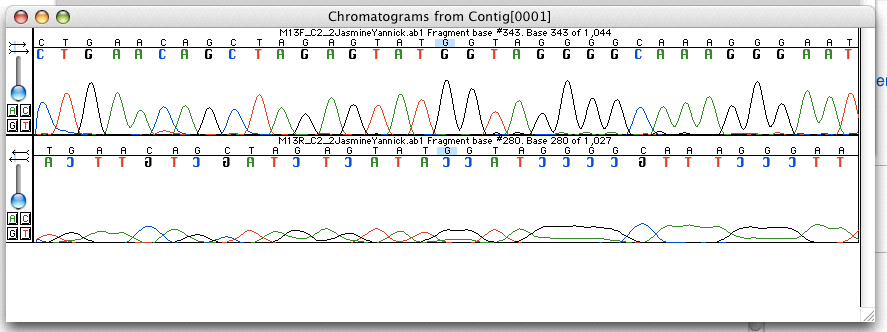Electropherogram Trace on:
[Wikipedia]
[Google]
[Amazon]


 An electropherogram, or electrophoregram, can also be referred to as an EPG or e-gram. It is a record or chart produced when
An electropherogram, or electrophoregram, can also be referred to as an EPG or e-gram. It is a record or chart produced when
PHPH
— web-based tool for electropherogram quality analysis
* ttp://dna.reinyday.com/464/ DYS464 Electropherogram Interpretation Discrepancywith images Applied genetics Biometrics DNA Genetic genealogy Genetics techniques Laboratory techniques {{Genetics-stub


 An electropherogram, or electrophoregram, can also be referred to as an EPG or e-gram. It is a record or chart produced when
An electropherogram, or electrophoregram, can also be referred to as an EPG or e-gram. It is a record or chart produced when electrophoresis
Electrophoresis, from Ancient Greek ἤλεκτρον (ḗlektron, "amber") and φόρησις (phórēsis, "the act of bearing"), is the motion of dispersed particles relative to a fluid under the influence of a spatially uniform electric f ...
is used in an analytical technique, primarily in the fields of forensic biology, molecular biology and biochemistry. The method utilizes data points that correspond with a specific time and fluorescence intensity at various wavelengths of light to represent a DNA profile.
In the field of genetics, an electropherogram is a plot of DNA fragment sizes, typically used for genotyping
Genotyping is the process of determining differences in the genetic make-up (genotype) of an individual by examining the individual's DNA sequence using biological assays and comparing it to another individual's sequence or a reference sequence. ...
such as DNA sequencing. The data is plotted with time, shown via base pairs (bps), on the x-axis and fluorescence intensity on the y-axis. Such plots are often achieved using an instrument such as an automated DNA sequencer paired with capillary electrophoresis (CE). Such electropherograms may be used to determine DNA sequence genotypes, or genotypes that are based on the length of specific DNA fragments or number of short tandem repeats (STR) at a specific locus by comparing the sample to internal size standards and allelic ladder data using the same size standard.Butler, J. M. (2015). Advanced topics in forensic Dna typing: Interpretation. Elsevier. These genotypes can be used for:
*genealogical DNA test
A genealogical DNA test is a DNA-based test used in genetic genealogy that looks at specific locations of a person's genome in order to find or verify ancestral genealogical relationships, or (with lower reliability) to estimate the ethnic m ...
ing
*DNA paternity testing
DNA paternity testing is the use of DNA profiles to determine whether an individual is the biological parent of another individual. Paternity testing can be especially important when the rights and duties of the father are in issue and a child' ...
*DNA profiling
DNA profiling (also called DNA fingerprinting) is the process of determining an individual's DNA characteristics. DNA analysis intended to identify a species, rather than an individual, is called DNA barcoding.
DNA profiling is a forensic t ...
*phylogenetics
In biology, phylogenetics (; from Greek φυλή/ φῦλον [] "tribe, clan, race", and wikt:γενετικός, γενετικός [] "origin, source, birth") is the study of the evolutionary history and relationships among or within groups ...
*population genetics
Population genetics is a subfield of genetics that deals with genetic differences within and between populations, and is a part of evolutionary biology. Studies in this branch of biology examine such phenomena as adaptation, speciation, and pop ...
See also
*Gel electrophoresis of nucleic acids
Nucleic acid electrophoresis is an analytical technique used to separate DNA or RNA fragments by size and reactivity. Nucleic acid molecules which are to be analyzed are set upon a viscous medium, the gel, where an electric field induces the nu ...
References
External links
PHPH
— web-based tool for electropherogram quality analysis
* ttp://dna.reinyday.com/464/ DYS464 Electropherogram Interpretation Discrepancywith images Applied genetics Biometrics DNA Genetic genealogy Genetics techniques Laboratory techniques {{Genetics-stub